
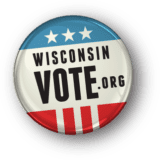
 While hardly surprising to anyone who read the polls, yesterday’s victory by Republican Governor Scott Walker was a body blow to Wisconsin unions and to American workers. Within Wisconsin, Walker’s victory ensures that his law repealing collective-bargaining rights for public employees will stay on the books, and if Republicans maintain their hold on the state senate—four of their senators faced recall elections, and as I write this at least three have survived—they will, at least in theory, be able to go forward on other parts of their Social Darwinist agenda. Whether they will—and whether they opt to go after private-sector unions, too, with right-to-work legislation—remains unclear. Such a move on Walker’s part, coming on the heels of the most divisive 18 months in the state’s history, would only escalate what is already a political civil war. Even Walker may think it the better part of valor to pass on that for now.
While hardly surprising to anyone who read the polls, yesterday’s victory by Republican Governor Scott Walker was a body blow to Wisconsin unions and to American workers. Within Wisconsin, Walker’s victory ensures that his law repealing collective-bargaining rights for public employees will stay on the books, and if Republicans maintain their hold on the state senate—four of their senators faced recall elections, and as I write this at least three have survived—they will, at least in theory, be able to go forward on other parts of their Social Darwinist agenda. Whether they will—and whether they opt to go after private-sector unions, too, with right-to-work legislation—remains unclear. Such a move on Walker’s part, coming on the heels of the most divisive 18 months in the state’s history, would only escalate what is already a political civil war. Even Walker may think it the better part of valor to pass on that for now.

When I arrived in this country, you conform to what is given. I came by myself. It’s very difficult living here without knowing anyone, not knowing where a store is, not having money to buy water or bread. When you find a job, if they offer you $50, you don’t have to think about it – you need this money, so you take it.
– Jose Juan Romero, restaurant worker
and former food-processing worker
If you’re like me, you probably try to watch what you eat, eat healthy, eat organic when possible, shop at the farmers’ market to support local family farmers… but have you thought about the workers who do the work to provide the food on your plate?
When I first became a vegetarian almost 20 years ago, I didn’t think about the workers. I made an ethical decision to change the way I ate,

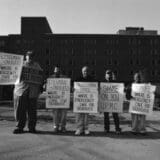
All the bad things you heard about the 2012 Whitney Biennial, which closes June 10, are too true. For some time now the Biennial has been a favorite piñata of conservative critics who’ve bristled at the introduction of Lowbrow art and other populist trends. This 76th biennial, however, annoyed a number of reviewers across the spectrum. Huffed the Village Voice:
Composed of arty ephemera, light musings on decades-old conceptual processes, and bogus curatorial gestures that conflate sculpture with performance and installation with music—the mind boggles at the notion of turning over most of the museum’s fourth floor to genre-mixing “free collage,” i.e., choreographer Sarah Michelson’s noodling at preview time—the 2012 biennial promulgates a dark sensibility as an artistic foil to America’s Tim Tebow culture.
Part of the reason some New Yorkers were riled up was the show’s corporate provenance: It was bankrolled by Sotheby’s and Deutsche Bank,
» Read more about: Closings: The Whitney Biennial's Dark Sparkle »


Here’s a headline you won’t see, but should: “Scott Walker Spent 88 percent of the Money to Get 53 Percent of the Vote.”
Political pundits will spend the next few days and weeks analyzing the Wisconsin recall election, examining exit polls, spilling lots of ink over how different demographic groups — income, race, religious, union membership, gender, party affiliation, independents, liberals/conservatives/moderates, etc — voted on Tuesday.
But the real winner in Wisconsin on Tuesday was not Gov. Scott Walker, but Big Money. And the real loser was not Milwaukee Mayor Tom Barrett, but democracy.
Walker’s Republican campaign outspent Barrett’s Democratic campaign by $30.5 million to $4 million — that’s a 7.5 to 1 advantage. Another way of saying this is that of the $34.5 million spent on their campaigns, Walker spend 88 percent of the money.
Walker beat Barrett by 1,316,989 votes to 1,145,190 votes — 53 percent to 46 percent (with 1 percent going to an independent candidate).
» Read more about: Wisconsin: Buying Democracy, One Vote at a Time »


Last week, more than 30 citations were issued by the California Occupational Safety and Health Administration (Cal/OSHA) to a waste recycling company called American Reclamation, Inc., its subsidiaries and a temporary employment agency. The citations dealt with serious violations at a material recovery facility in Los Angeles, which is where trash is sorted by hand to remove recyclables from other waste.
Cal/OSHA cited the company for violations of health and safety standards,
failure to train workers properly and a host of other unlawful practices. I’m happy that our state health and safety enforcers caught these violations, but I fear that the lack of enforcement resources in California means many other violations at other facilities are slipping through the cracks.
Coming off a thrilling victory on banning plastic bags, the City of L.A.’s next waste discussion centers on taming the currently out-of-control open permit system that governs how waste is collected for business and large apartment buildings.
» Read more about: Waste Violations Hurt L.A. Workers and the Environment »
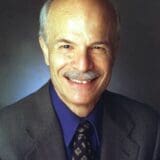
Since his sudden death in April, I’ve been trying to imagine the health care movement without Rick Brown’s wise counsel, coherent advocacy, and perfect research. E. Richard Brown was a professor of Public Health at UCLA whose research and advocacy touched millions of lives. As a health activist and advocate, I worked with Rick to save California’s county hospitals and health centers, and I use his research, especially the California Health Interview Survey (CHIS) to illustrate the health care needs of various populations in California when I write grant proposals for nonprofit organizations. He was always happy to give me advice about how to frame an argument, and he was always willing to meet with policy makers when activists needed an authority to support them.
The memorial service held on May 29 filled UCLA’s Schoenberg Hall. The crowd included the health activists, labor leaders, UCLA faculty colleagues, and politicians who worked with Rick to gain recognition of health care as a basic human right,
» Read more about: E. Richard Brown: Health Advocate Leaves a Legacy of Justice »


The 20th anniversary of the Los Angeles riots has triggered a number of fascinating reports examining the underlying causes of the unrest and the changes (in attitudes and actions) that have taken place in the past two decades.
Scholars at the University of Southern California produced a report called L.A. Rising: The 1992 Civil Unrest, the Arc of Social Justice Organizing, and the Lessons for Today’s Movement Building. Their counterparts at L.A.’s Loyola Marymount University, published 20th Anniversary of the Los Angeles Riots Survey. And my colleagues at the Los Angeles Alliance for a New Economy (on whose board I proudly serve) published a series of reflections by L.A. activists called Rage and Reflection: Meditations on LA’s 1992 Civil Unrest and the Ongoing Transformation of a City.
» Read more about: "Riots" or "Rebellion": What We Learned from 1992 »


“More deeply still, nonviolence is a spiritual challenge of epic proportions. It calls upon the soul’s authentic longing for heroism, for risking one’s life for an infinite stake, for self-transcendence in giving oneself to another.” – Walter Wink
After Reinhold Niebuhr succumbed to Cold War fever, there was no longer a major voice in Christian ethics among Protestants. In seminary, I myself had to read Paul Ramsey, who couldn’t get any closer to examining the ethics of war than resuscitating Just War Theory from the late days of the Roman Empire. Most of us who opposed the Vietnam War were stuck with a rationale that this-war-in-particular was unjust and therefore should be stopped. Since no one could articulate a thorough critique from a non-violent perspective, we were flying by the seats of our intellectual pants.
Little did I know that alongside mainstream Christian ethics, hidden somewhere in the obscure hallways of academia,
» Read more about: Remembering Walter Wink: Ethical Thought behind Non-Violence »


(This post originally appeared in Labor’s Edge, the blog of the California Labor Federation)
Zombies are everywhere these days. They’re on popular TV shows. They’re in the movies. They’re in our nightmares. But what many Californians don’t know is that zombies are a primary reason of our ongoing budget crisis.
Yes, that’s right. We call them Zombie Loopholes, and they’re devouring our state’s budget.
Today, the California Labor Federation launched a new website to highlight the devastating impact that budget-killing corporate tax breaks are having on our state.ZombieLoopholes.com brings a number of wasteful corporate tax breaks that are bleeding our state of billions each year out of the shadows so the public is aware that they’re contributing to deep budget cuts to school funding, services for seniors and public safety.
With the state facing another budget crisis and more cuts to services we value,
» Read more about: Zombie Loopholes Are Eating California’s Budget Alive »


The Board of the Los Angeles Department of Water and Power took a huge step towards a greener, more efficient Los Angeles last Thursday. With a unanimous vote, the Board more than doubled LADWP’s investment in energy efficiency programs while also committing to sustaining that investment over the long term.
The Board set a goal of reducing energy consumption “at least 10%” with a soft target of 15% by 2020, pending the results of a new energy efficiency potential study. “These are significant increases and set LADWP on the path to be a leader in energy efficiency, allowing its customers to take advantage of this clean and cheap source of power,” NRDC’s Kristin Eberhard blogged the next day. “A robust energy efficiency budget can help create jobs and displace dirty coal in LADWP’s portfolio.” The vote came after over a year-and-a-half of organizing by a diverse coalition of environmentalists,
» Read more about: LADWP Board Votes to Dramatically Increase Energy Efficiency and Jobs Programs »


By Lenny Goldberg, California Tax Reform Association, and Roy Ulrich, Goldman School of Public Policy at U.C. Berkeley
(This article first appeared in the California Progress Report.)
Jerry Brown’s most recent budget proposal takes a meat ax to vital programs, including Medi-Cal and in home support services (IHHS). Why do we refer to them as “vital?” IHHS, for example, helps the disabled and seniors live safely in their own homes, thus obviating the need to place them in more costly outside facilities.
The governor’s plan represents the latest and worst in a spending cuts-only approach which California seems to specialize in. Reaping the benefits of this approach are the rich and powerful. The losers are those without high-priced lobbyists: the poor and the weak.
There are several potential revenue sources the rich and powerful have been able to avoid while other states,


Here’s a fun fact you probably didn’t know: Arizona’s notorious SB 1070 law was born in a Walmart.
Yes, the inspiration for the most draconian anti-immigrant legislation in the nation, a measure that permits law enforcement to ask about immigration status, one that swings the door wide open for racial profiling—SB 1070—reportedly sprang from a moment of inspiration at a Walmart checkstand.
This origins story is brought to you courtesy of the Ministry of Citizenship, a faux MinuteMan-style group that purports to be a fan of the legislation. According to the Ministry, it happened this way: state representative Russell Pearce, the measure’s sponsor, “hatched the idea for SB 1070 late one night while waiting in the checkout line at Walmart.”
“Here I was just trying to buy some Cheetos and cat litter, and the crowds were just horrendous,” the Ministry quotes Pearce as saying.
» Read more about: Anti-Immigrant Legislation has Walmart Roots »

Dolores Huerta, co-founder of the United Farm Workers and long-time activist who has lent her strength to countless social and economic justice fights, received the Presidential Medal of Freedom from President Obama on Tuesday.
“Dolores was very gracious when I told her I had stolen her slogan, ‘Si, se puede.’ Yes, we can,” Obama joked during the ceremony. “Knowing her, I’m pleased she let me off easy, because Dolores does not play.”
He explained that throughout Huerta’s work, “She has fought to give more people a seat at the table. ‘Don’t wait to be invited,’ she says, ‘Step in there.’”
“I was humbled, thrilled, and surprised. I never expected to be nominated,” Huerta, 82, told the Daily Beast about the honor. She said the medal highlights the power of “organizing at the grassroots level,” and “how important that is in keeping our democracy alive.”

That activism,
» Read more about: Dolores Huerta Honored with Presidential Medal of Freedom »


David Brooks, the usually buttoned-down columnist for the New York Times, succumbed recently to a peculiar eruption of Id. Like many of his fellow conservatives, he’s in a snit about The Life of Julia, an Obama campaign slideshow that portrays the title character benefiting from federal programs like Head Start and Social Security. (See my previous article here.) Brooks casts Julia as a “vision of government as national Sugar Daddy, delivering free money and goodies up and down the life cycle.” My attention was riveted by that term, “Sugar Daddy,” which doesn’t just refer, say, to a rich uncle, but to an older man who showers gifts on a young woman, often, by implication, in return for sexual favors. It’s difficult to imagine Brooks taking a detour into so dark a recess of the imagination if it had been The Life of James.



(The following news announcement was issued by the Harvard Business School.)
Research published today in Science sheds light on a hot-button political issue: the role and effectiveness of government regulation. Does it kill jobs or protect the public?
The new study, co-authored by Harvard Business School Professor Michael Toffel, Professor David Levine of the Haas School of Business at the University of California, Berkeley, and Boston University doctoral student Matthew Johnson, examines workplace safety inspections conducted by California’s Division of Occupational Safety and Health (Cal/OSHA). The authors carried out the first evaluation of a “clinical trial” of the state’s mandated randomized inspections to discern their effect on both worker safety and companies’ bottom lines.
The results overturn conventional wisdom: Workplace inspections do reduce on-the-job injuries and their associated costs, and the researchers could not detect any harm to companies’


 Economic development in Arizona is now by corporations for corporations and the public is left to in the dark as to how its tax dollars are spent. Last year the state’s Department of Commerce was replaced by the public-private Arizona Commerce Authority (ACA), steered by a board of mostly corporate representatives. The ACA’s website picture shows the board of directors as Governor Jan Brewer with 18 corporate titans. The bottom of the page mentions a smaller number of “ex-officio” public officials associated with the board who aren’t named or pictured.
Economic development in Arizona is now by corporations for corporations and the public is left to in the dark as to how its tax dollars are spent. Last year the state’s Department of Commerce was replaced by the public-private Arizona Commerce Authority (ACA), steered by a board of mostly corporate representatives. The ACA’s website picture shows the board of directors as Governor Jan Brewer with 18 corporate titans. The bottom of the page mentions a smaller number of “ex-officio” public officials associated with the board who aren’t named or pictured.
Though not listed on the website, the ACA also depends on corporate donations for its office space, its corporate-sized CEO salary, and much of its operating budget. The arrangement would pose unsettling conflict-of-interest problems for any authority that performs a public function.
But this isn’t just any agency. Its task is to try boosting the state economy by handing out taxpayer-financed subsidies to individual companies of its choosing.
» Read more about: Arizona’s Taxes Help Corporations Subsidize Themselves »


 (The following post appeared yesterday on California Progress Report; a slightly shorter version was first posted on the Consumer Federation of California‘s Web site.)
(The following post appeared yesterday on California Progress Report; a slightly shorter version was first posted on the Consumer Federation of California‘s Web site.)
By Richard Holober
Californians are exposed to dangerous levels of toxic chemicals in our homes, thanks to a 37 year old state furniture regulation. While the regulation never served its intended goal of reducing fires in our homes, its legacy of toxic harm lives on.
Click here to ask the Governor to take toxics out of our furniture.
In May 2012, a remarkable investigative series in the Chicago Tribune exposed decades of lies, coercion and influence peddling by flame retardant manufacturers. The report describes how a chemical industry front group paid a medical school professor to travel to Sacramento to testify on two separate occasions before the state legislature.
» Read more about: Getting the Poison Out of Our Furniture »


 Solid waste company American Reclamation, Inc. which for months has come under heavy fire over alleged safety violations and poor treatment of its employees, was cited by Cal/OSHA this week following an investigation by the agency into conditions at its Atwater recycling facility.
Solid waste company American Reclamation, Inc. which for months has come under heavy fire over alleged safety violations and poor treatment of its employees, was cited by Cal/OSHA this week following an investigation by the agency into conditions at its Atwater recycling facility.
Cal/OSHA issued 36 citations to the company, its recycling subsidiary, South Coast Fibers, Inc. and their staffing agency totaling nearly $40,000 in penalties.
The investigation stemmed from complaints filed by Karla Campos, a 25-year-old Glendale resident and former American Reclamation worker. “American Reclamation treats us worse than the trash we sort,” said Campos, who has charged that she was fired by the company after falling on trash and breaking her tailbone.
The citations come as the L.A. City Council considers adopting a new exclusive franchise system for commercial and multifamily waste. The system would mitigate many of the problems found in the current system —
» Read more about: Cal/OSHA Cites American Reclamation for Unsafe Conditions »


It’s hard to know where to begin. A co-worker walked onto the restaurant floor after her break. She was shaking her head. She’d been on the computer downstairs.
“It’s official,” she said. “Obama was born in Kenya. He wasn’t born in America.”
I took a deep breath. The kind normally reserved for hearing alien abduction stories. The kind of deep breath I have to take before telling my nephews that there is no monster living in their closet. The kind of deep breath I take before watching Fox News.
What I find fascinating, appalling and comical about “Birther” conspiracy theories is that it doesn’t matter how many times Obama himself shows his birth certificate. They all derive from the notion that President Obama is not being honest with us. That he is lying.
A recent post by the right-leaning Breitbart.com might even explain the origin of the Obama birthplace rumors.
» Read more about: Birther Smackdown: Obama and Shakespeare »


 We all know the wealthy and well-connected are accustomed to playing by their own set of rules. Their high-powered lawyers and lobbyists write special exemptions for them the rest of us would never be able to get.
We all know the wealthy and well-connected are accustomed to playing by their own set of rules. Their high-powered lawyers and lobbyists write special exemptions for them the rest of us would never be able to get.
For instance, G.E. made $14.2 billion in profits yet paid no taxes to the federal government – in fact, they got a refund. Despite crashing our economy and getting a massive bailout from taxpayers, the big banks somehow evade meaningful financial industry regulations. Corporate CEOs are slashing the jobs, wages and retirement of rank-and-file workers, but still giving themselves record bonuses and golden parachutes.
It’s not that there aren’t rules that we should all live by to make this a more fair and equitable society. It’s just that the very wealthy know how to get around those rules by creating a maze of exemptions that allow them to gain even more power at our expense.
» Read more about: “Stop Special Interest Money Now Act” Isn’t What It Seems »